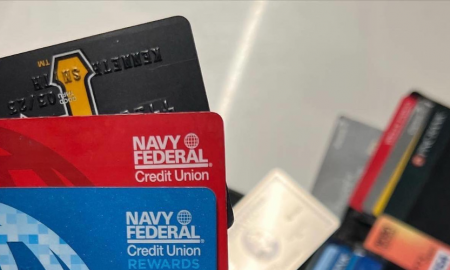
How to Dodge High APR on Personal Loans & Lock in the Best Rates

Securing a ‘good’ Annual Percentage Rate (APR) on your personal loan is no easy feat. It requires a deeper financial literacy. Generally speaking, any percentage below 10% APR is a “good” APR on personal loans. So how can you secure a “good” APR? Well, rather than accepting the ‘conventional APR offerings,’ which are higher, there are strategic maneuvers you can employ to lock in more favorable rates.
Here is how you can ‘dodge’ the higher end of the APR spectrum and secure a deal that better fits your financial silhouette.
Polish Your Credit Score to Perfection
Your credit score is the linchpin in the machine that determines your APR. It is a numerical summary of your credit history, and lenders use it to gauge your reliability as a borrower. A high score can significantly tilt the APR scales in your favor.

Energy Pic / Pexels / Your credit history plays a pivotal role in determining your APR. So, make sure to have a “good” credit score.
Here is how you can buff your score to a shine:
- Regularly Check Your Credit Report: Errors can drag your score down. Dispute any inaccuracies you find.
- Pay Down Debts: Lowering your credit utilization ratio can boost your score.
Do not forget to pay bills on time. Even one late payment can dent your credit score. Set up reminders or auto-pay to stay on track.
Lower Your Debt-to-Income (DTI) Ratio
Your DTI ratio is another critical factor lenders consider. It compares your total monthly debt payments to your gross monthly income. A lower ratio signals to lenders that you are not overextended and can manage additional debt, potentially leading to a better APR.
To improve your DTI:
- Increase Income: Whether it is taking on additional work or negotiating a higher salary, increasing your income lowers your DTI ratio.
- Reduce Debt: Focus on paying down existing debts, especially high-interest credit cards or loans.

Karolina / Pexels / Apart from your credit history, your debt-to-income ratio matters big time. Lower it to the best of your abilities.
Offer Collateral When Possible
While many personal loans are unsecured, offering collateral can make a significant difference. Secured loans, backed by assets like a car or savings account, generally come with lower APRs because they present less risk to the lender.
If you have assets to offer as collateral, consider a secured loan to potentially lower your APR.
Shop Around and Compare Offers
Do not just accept the first loan offer you receive. Shopping around and comparing rates from multiple lenders can lead to substantial savings. Consider various types of lenders, including:
- Banks: Traditional banks might offer competitive rates for customers with good credit.
- Credit Unions: As member-owned institutions, credit unions often provide lower rates.
- Online Lenders: They may offer more flexible terms and lower rates, especially for borrowers with strong credit.
Negotiate Better Terms

Bruce / Unsplash / Do not blindly accept the first loan offer. Instead, shop around and grab the best deal.
Believe it or not, loan terms can sometimes be negotiable. This is particularly true if you have a strong credit profile or an existing relationship with the lender.
Here is how to approach negotiation:
- Be Informed: Know the average APRs for your credit tier and bring competitor offers to the table.
- Highlight Your Strengths: Emphasize your credit score, low DTI, or any assets you are willing to offer as collateral.
- Ask Directly: Sometimes, simply asking for a better rate or lower fees can yield favorable adjustments.
Ensure Strategic Timing
Your application’s timing can also influence your APR. Economic conditions fluctuate, and so do interest rates. If you are not in urgent need of a loan, monitor rate trends and apply when rates are generally lower. Additionally, consider your own financial cycle – applying after a salary increase or debt reduction can improve your borrowing profile.
In the long term, focusing on overall financial health can lead to better loan terms. Building an emergency fund, diversifying income sources, and maintaining a budget that prioritizes debt repayment can all contribute to a stronger financial standing, making you a more attractive candidate for lower APRs.
More in Loans & Mortgages
-
How Much Did John Krasinski Make from “The Office”? Revealing His Earnings
John Krasinski, the charming actor audiences know best as Jim Halpert from the beloved sitcom “The Office,” has amassed a significant...
May 27, 2024 -
How Mortgage Brokers Rip You Off and Ways to Prevent It
Buying a home is a thrilling yet undeniably complex journey. Amidst the excitement of house hunting and envisioning your future life...
May 23, 2024 -
Angelina Jolie’s Plastic Surgery – Debunking Myths and Realities
Angelina Jolie has captivated audiences for decades with her undeniable talent and mesmerizing beauty. Her sharp features and striking cheekbones have...
May 17, 2024 -
How Old Do You Have to Be to Buy a House? Exploring Legal Limits
Dreaming of that perfect place to call your own? A cozy haven bathed in afternoon sunlight, a backyard begging for barbecues...
May 11, 2024 -
How to Quit a Job Without Burning Bridges?
So, it’s time to say goodbye. Maybe you’ve landed your dream job, or perhaps you’re embarking on a new adventure. Whatever...
May 1, 2024 -
What Credit Bureau Does Navy Federal Use for Credit Card Approvals?
When it comes to choosing a credit card, understanding the behind-the-scenes processes can make a world of difference. So, you’re probably...
April 25, 2024 -
Has the FBI Arrested P Diddy? What You Need to Know About P Diddy Arrest
In recent developments that have captivated the public and media alike, the homes of Sean “Diddy” Combs, also known as Puff...
April 17, 2024 -
3 Easy Ways to Cash in Your Savings Bonds
Online With a TreasuryDirect Account In the age of digital banking and online investments, managing your savings bonds electronically is a...
April 11, 2024 -
How Employees Can Be Motivated By Their Own Work?
If there is one question every employee asks, it is: What makes a job fun and motivating? Well, this is not...
April 4, 2024














You must be logged in to post a comment Login